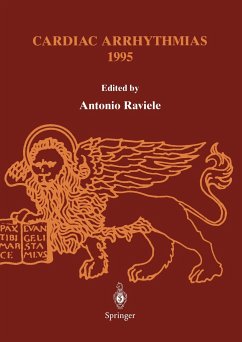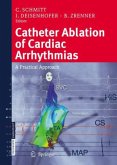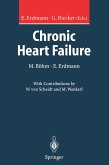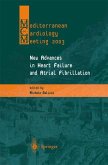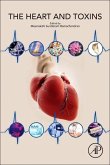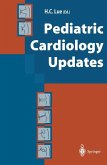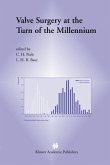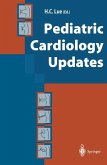Antonio Raviele
Cardiac Arrhythmias 1995
Proceedings of the 4th International Workshop on Cardiac Arrhythmias (Venice, 6¿8 October 1995)
Antonio Raviele
Cardiac Arrhythmias 1995
Proceedings of the 4th International Workshop on Cardiac Arrhythmias (Venice, 6¿8 October 1995)
- Broschiertes Buch
- Merkliste
- Auf die Merkliste
- Bewerten Bewerten
- Teilen
- Produkt teilen
- Produkterinnerung
- Produkterinnerung
The subject of cardiac arrhythmias is of practical relevance. Various arrhythmias are found in different clinical situations, such as premature complexes in healthy individuals, supraventricular tachyarrhythmias in patients with Wolff-Parkinson-White snydrome, atrioventricular block, and ventricular fibrillation in cardiopathic conditions, especially in patients with ischemic disease. Topics of major interest are discussed in this volume: malignant ventricular arrhythmias, sudden death, automatic implantable cardioverter defibrillators, syncope, current indications for pacing therapy, radiofrequency catheter ablation, flutter, and atrial fibrillation.…mehr
Andere Kunden interessierten sich auch für
![Catheter Ablation of Cardiac Arrhythmias Catheter Ablation of Cardiac Arrhythmias]() C. Schmitt / I. Deisenhofer / B. Zrenner (eds.)Catheter Ablation of Cardiac Arrhythmias112,99 €
C. Schmitt / I. Deisenhofer / B. Zrenner (eds.)Catheter Ablation of Cardiac Arrhythmias112,99 €![Chronic Heart Failure Chronic Heart Failure]() Michael BöhmChronic Heart Failure75,99 €
Michael BöhmChronic Heart Failure75,99 €![New Advances in Heart Failure and Atrial Fibrillation New Advances in Heart Failure and Atrial Fibrillation]() Michele Gulizia (ed.)New Advances in Heart Failure and Atrial Fibrillation115,99 €
Michele Gulizia (ed.)New Advances in Heart Failure and Atrial Fibrillation115,99 €![Heart and Toxins Heart and Toxins]() Dr. Meenakshisundaram Sundaram RamachandranHeart and Toxins221,99 €
Dr. Meenakshisundaram Sundaram RamachandranHeart and Toxins221,99 €![Pediatric Cardiology Updates Pediatric Cardiology Updates]() Pediatric Cardiology Updates39,99 €
Pediatric Cardiology Updates39,99 €![Valve Surgery at the Turn of the Millennium Valve Surgery at the Turn of the Millennium]() Valve Surgery at the Turn of the Millennium38,99 €
Valve Surgery at the Turn of the Millennium38,99 €![Pediatric Cardiology Updates Pediatric Cardiology Updates]() Pediatric Cardiology Updates39,99 €
Pediatric Cardiology Updates39,99 €-
-
-
The subject of cardiac arrhythmias is of practical relevance. Various arrhythmias are found in different clinical situations, such as premature complexes in healthy individuals, supraventricular tachyarrhythmias in patients with Wolff-Parkinson-White snydrome, atrioventricular block, and ventricular fibrillation in cardiopathic conditions, especially in patients with ischemic disease. Topics of major interest are discussed in this volume: malignant ventricular arrhythmias, sudden death, automatic implantable cardioverter defibrillators, syncope, current indications for pacing therapy, radiofrequency catheter ablation, flutter, and atrial fibrillation.
Hinweis: Dieser Artikel kann nur an eine deutsche Lieferadresse ausgeliefert werden.
Hinweis: Dieser Artikel kann nur an eine deutsche Lieferadresse ausgeliefert werden.
Produktdetails
- Produktdetails
- Verlag: Springer / Springer Milan / Springer, Berlin
- Artikelnr. des Verlages: 978-3-540-75012-3
- 1996.
- Seitenzahl: 264
- Erscheinungstermin: 1. Oktober 1995
- Englisch
- Abmessung: 297mm x 210mm x 15mm
- Gewicht: 844g
- ISBN-13: 9783540750123
- ISBN-10: 3540750126
- Artikelnr.: 33071778
- Herstellerkennzeichnung
- Springer-Verlag GmbH
- Tiergartenstr. 17
- 69121 Heidelberg
- ProductSafety@springernature.com
- Verlag: Springer / Springer Milan / Springer, Berlin
- Artikelnr. des Verlages: 978-3-540-75012-3
- 1996.
- Seitenzahl: 264
- Erscheinungstermin: 1. Oktober 1995
- Englisch
- Abmessung: 297mm x 210mm x 15mm
- Gewicht: 844g
- ISBN-13: 9783540750123
- ISBN-10: 3540750126
- Artikelnr.: 33071778
- Herstellerkennzeichnung
- Springer-Verlag GmbH
- Tiergartenstr. 17
- 69121 Heidelberg
- ProductSafety@springernature.com
Sudden Death and Ventricular Arrhythmias.- Non-sustained ventricular tachycardia: is it possible to identify the high-risk patients and how to treat them?.- QT prolongation in postinfarction patients and sudden death: which relationship?.- T wave alternans. A marker of vulnerability to ventricular tachyarrhythmias.- Idiopathic ventricular fibrillation: which prognosis and treatment?.- Beta blockers, sotalol or amiodarone for the treatment of malignant ventricular arrhythmias?.- New antiarrhythmic drugs for ventricular arrhythmias: do they work?.- What have we learned from the SWORD trial? Can potassium channel blockers reduce sudden cardiac death?.- To treat or not to treat ventricular arrhythmias in dilated cardiomyopathy?.- Which therapeutic approach for patients with hypertrophic cardiomyopathy and ventricular arrhythmias?.- Radiofrequency catheter ablation of ventricular tachycardia in patients with structural heart disease: pathophysiologic considerations to simplify the selection of target sites.- Implantable Defibrillators.- Is total mortality really reduced by the implantable cardioverter defibrillator?.- What are the acute and long-term results of transvenous implantable cardioverter defibrillators?.- How to prevent or avoid inappropriate implantable cardioverter defibrillator shocks?.- What have we learned from stored implantable cardioverter defibrillator electrocardiograms about the mechanism of sudden death?.- Implantable cardioverter defibrillator: a therapy for everyone or for selected patients?.- Implantable cardioverter defibrillator technology in the next ten years: what can be expected?.- Syncope.- Spontaneous asystolic pauses: how frequent is a neuromediated mechanism?.- Pathophysiology of neurally mediated syncope: peripheral and central mechanisms.- Syncope of unknown origin: first head-up tilt test or electrophysiologic study?.- Methodology of head-up tilt test: what is the sensitivity and specificity of the different protocols?.- What do we know today about the outcome of vasovagal syncope?.- Vasovagal syncope with asystolic pause: drugs, pacemaker, or both?.- Invasive tilt testing: the search for a new sensor to permit earlier pacing therapy in vasovagal syncope.- Cardiac Pacing.- Isolated first-degree atrioventricular block: a new indication for dual-chamber pacing?.- Physiologic dual-chamber pacing with short atrioventricular delay in dilated cardiomyopathy: which hemodynamic effects and clinical results?.- Dual-chamber pacing in obstructive hypertrophic cardiomyopathy: is there evidence for a real benefit?.- Automatic mode switching: how useful is it?.- Extraction of chronically implanted pacemaker leads: when and how?.- Supraventricular Tachycardias.- Transesophageal pacing during exercise: is it useful to evaluate palpitations of unknown origin?.- New approaches to treatment of atrial tachycardia.- Atrioventricular node anatomy and physiology: what have we learned from catheter ablation?.- Radiofrequency ablation of atrioventricular node reentrant tachycardias: which results and predictors of success and recurrence?.- Surface electrocardiogram in ventricular pre-excitation: how reliable is it to locate the site of accessory pathways?.- Radiofrequency ablation in the Wolff-Parkinson-White syndrome: do the results justify a widespread application?.- Recurrent palpitations after successful radiofrequency ablation of supraventricular tachycardias: which significance?.- Antiarrhythmic therapy of supraventricular tachyarrhythmias: which role for the drugs today?.- Radiofrequency ablation of supraventricular tachycardias in infants and children: when is it really indicated?.- Atrial Fibrillation and Atrial Flutter.- Lone atrial fibrillation: which anatomical and electrophysiologic substrate?.- Is mortality in patients with atrial fibrillation related to the underlying heart disease or to the arrhythmia?.- Thromboembolic risk in patients with atrial fibrillation: can it be predicted on the basis of clinical variables?.- Should all patients undergo transesophageal echocardiography before electrical cardioversion of atrial fibrillation?.- Anticoagulation in atrial fibrillation: is aspirin sufficient?.- Pharmacologic cardioversion of atrial fibrillation: always the same algorithm or different drugs for different patients?.- Prophylaxis of atrial fibrillation: what are the benefits and risks of the different antiarrhythmic drugs?.- Atrial fibrillation with a slow ventricular response: is theophylline a good alternative to a pacemaker?.- Control of rapid heart rate in patients with atrial fibrillation: drugs or ablation?.- How effective and safe is internal direct current shock for atrial fibrillation refractory to external cardioversion?.- Automatic implantable atrial defibrillator: a dream or a real prospect?.- Paroxysmal atrial flutter: which mechanism and treatment in the era of catheter ablation?.- Author Index.
Sudden Death and Ventricular Arrhythmias.- Non-sustained ventricular tachycardia: is it possible to identify the high-risk patients and how to treat them?.- QT prolongation in postinfarction patients and sudden death: which relationship?.- T wave alternans. A marker of vulnerability to ventricular tachyarrhythmias.- Idiopathic ventricular fibrillation: which prognosis and treatment?.- Beta blockers, sotalol or amiodarone for the treatment of malignant ventricular arrhythmias?.- New antiarrhythmic drugs for ventricular arrhythmias: do they work?.- What have we learned from the SWORD trial? Can potassium channel blockers reduce sudden cardiac death?.- To treat or not to treat ventricular arrhythmias in dilated cardiomyopathy?.- Which therapeutic approach for patients with hypertrophic cardiomyopathy and ventricular arrhythmias?.- Radiofrequency catheter ablation of ventricular tachycardia in patients with structural heart disease: pathophysiologic considerations to simplify the selection of target sites.- Implantable Defibrillators.- Is total mortality really reduced by the implantable cardioverter defibrillator?.- What are the acute and long-term results of transvenous implantable cardioverter defibrillators?.- How to prevent or avoid inappropriate implantable cardioverter defibrillator shocks?.- What have we learned from stored implantable cardioverter defibrillator electrocardiograms about the mechanism of sudden death?.- Implantable cardioverter defibrillator: a therapy for everyone or for selected patients?.- Implantable cardioverter defibrillator technology in the next ten years: what can be expected?.- Syncope.- Spontaneous asystolic pauses: how frequent is a neuromediated mechanism?.- Pathophysiology of neurally mediated syncope: peripheral and central mechanisms.- Syncope of unknown origin: first head-up tilt test or electrophysiologic study?.- Methodology of head-up tilt test: what is the sensitivity and specificity of the different protocols?.- What do we know today about the outcome of vasovagal syncope?.- Vasovagal syncope with asystolic pause: drugs, pacemaker, or both?.- Invasive tilt testing: the search for a new sensor to permit earlier pacing therapy in vasovagal syncope.- Cardiac Pacing.- Isolated first-degree atrioventricular block: a new indication for dual-chamber pacing?.- Physiologic dual-chamber pacing with short atrioventricular delay in dilated cardiomyopathy: which hemodynamic effects and clinical results?.- Dual-chamber pacing in obstructive hypertrophic cardiomyopathy: is there evidence for a real benefit?.- Automatic mode switching: how useful is it?.- Extraction of chronically implanted pacemaker leads: when and how?.- Supraventricular Tachycardias.- Transesophageal pacing during exercise: is it useful to evaluate palpitations of unknown origin?.- New approaches to treatment of atrial tachycardia.- Atrioventricular node anatomy and physiology: what have we learned from catheter ablation?.- Radiofrequency ablation of atrioventricular node reentrant tachycardias: which results and predictors of success and recurrence?.- Surface electrocardiogram in ventricular pre-excitation: how reliable is it to locate the site of accessory pathways?.- Radiofrequency ablation in the Wolff-Parkinson-White syndrome: do the results justify a widespread application?.- Recurrent palpitations after successful radiofrequency ablation of supraventricular tachycardias: which significance?.- Antiarrhythmic therapy of supraventricular tachyarrhythmias: which role for the drugs today?.- Radiofrequency ablation of supraventricular tachycardias in infants and children: when is it really indicated?.- Atrial Fibrillation and Atrial Flutter.- Lone atrial fibrillation: which anatomical and electrophysiologic substrate?.- Is mortality in patients with atrial fibrillation related to the underlying heart disease or to the arrhythmia?.- Thromboembolic risk in patients with atrial fibrillation: can it be predicted on the basis of clinical variables?.- Should all patients undergo transesophageal echocardiography before electrical cardioversion of atrial fibrillation?.- Anticoagulation in atrial fibrillation: is aspirin sufficient?.- Pharmacologic cardioversion of atrial fibrillation: always the same algorithm or different drugs for different patients?.- Prophylaxis of atrial fibrillation: what are the benefits and risks of the different antiarrhythmic drugs?.- Atrial fibrillation with a slow ventricular response: is theophylline a good alternative to a pacemaker?.- Control of rapid heart rate in patients with atrial fibrillation: drugs or ablation?.- How effective and safe is internal direct current shock for atrial fibrillation refractory to external cardioversion?.- Automatic implantable atrial defibrillator: a dream or a real prospect?.- Paroxysmal atrial flutter: which mechanism and treatment in the era of catheter ablation?.- Author Index.

